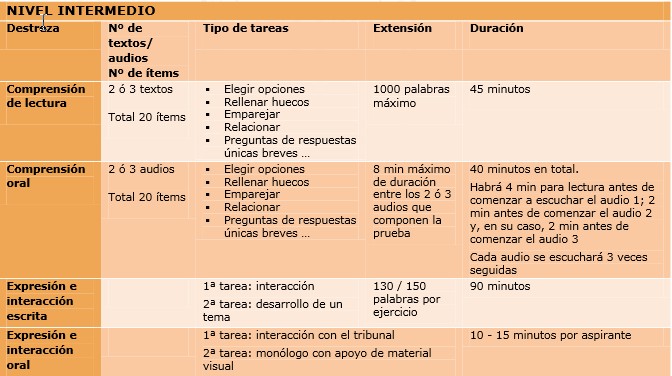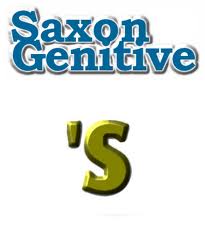
The SPEAKING TEST consta de tres partes .
- En la primera parte ,(1 ó 2 m) el examinador hará preguntas de carácter general cuyas respuestas no contarán de cara a la nota final. No tiene otro objetivo que ayudar a que el alumno se sienta más cómodo.
- La segunda parte del examen es la INTERACCIÓN . En esta parte el examinador interactuará con el alumno. En el Nivel Básico, se le dará al alumno una situación (role-play) donde tendrá que asumir el papel que se le indique. En el Nivel Intermedio , el examinador elegirá un tema y hará preguntas al candidato.
- La tercera parte del examen es lo que denomina DISCURSO CONTINUO . Aquí el candidato tendrá que hablar sobre unas fotografías ( máximo tres) sin ninguna intervención por parte del examinador . En el Nivel Básico se pedirá al candidato que compare y describa , y en el Nivel Intermedio que describa y compare las fotos y hablé ,además ,sobre el tema sugerido en las mismas.
ALGUNOS CONSEJOS SOBRE EL EXAMEN ORAL.
El examen oral es tu oportunidad de brillar .El examinador espera de ti que utilices variedad de estructuras y vocabulario adecuado al nivel del que te examinas. Si estás en Intermedio y utilizas vocabulario y estructuras de Nivel básico , aunque no tengas errores no es probable que apruebes . Es importante que respondas a las preguntas del examinador con respuestas largas, desarrollando tus ideas. No esperes a que el examinador te pregunte “por qué” a una pregunta que te ha realizado, lo normal es que tu ofrezcas esa explicación y que el profesor no necesite aclaración ninguna. No te olvides además de usar conectores para enlazar tus ideas, no utilices siempre los mismos , recuerda que es tu momento de brillar.
Mira este video. Ilustra muy bien lo que intento explicarte arriba.
En el examen oral , como ya te he explicado, tienes que utilizar variedad de estructuras . Mira este video de 5 m para aprender diferentes expresiones para substituir I like/ I don’t like. Aquí
Enlaces a páginas que pueden ayudarte a preparar el examen
NIVEL BASICO
♥EXAMEN ORAL
DESCRIPCION DE FOTOGRAFIAS
1. Blog de Cristina .Descripción de personas , Descripcion de una foto
2. Writefix.com . Al pasar el cursor por encima de las fotos, te ofrece sugerencias de vocabulario y estructuras para ayudarte a describir.La sección se llama PET SPEAKING.
3. El British Council en su web , publica un video donde dos estudiantes describen una fotografia . Video aqui, tapescript aqui
4. Blog de Cristina. Ejemplos de descripcion de fotografias realizadas por alumnos de la EOI
aquí y aqui
ROLE PLAYS
1. Blog de Cristina con ejemplos ( algunas interactivos) de distintos role-plays. Aquí
2. Twominenglish.com. Videos para practicar role-plays : at the restaurant, shopping or at the airport. Repetiras las frases más comunes para cada una de estas situaciones.
3. http://simpleesl.com/coleccion de 16 role-plays para continuar practicando
♥READING
Esl-bits.net. Haz clic en uno de los Tests ( numerados del 1 al 19 ) y elije que tipo de ejercicio quieres hacer (signs,details,matching..,)
NIVEL INTERMEDIATE
♥SPEAKING
INTERACCIÓN
1 Blog de Cristina. Temas variados acompañados de fotografias .
2. Eslconversationquestions.com/
4. En Ielts Speaking puedes preparar 16 temas de examen (Towns and Cities, Clothes and fashion…etc ) . Leerás las preguntas que hacen los examinadores y las respuestas que a los examinadores les gustaría oir con el vocabulario especifico marcado en negrita.
5.En Digilander.libero.it/puedes ver algunas Useful expressions for the speaking exam que tal vez te sirvan de ayuda.
♥READING
1. The British Council en su sección para teens puede ayudarte
2. Blog de Cristina . Sección Reading (scroll down)
♥WRITING
WriteFix.com ofrece ejemplos de expresión escrita . Solapa CAUSE AND EFFECT:HOME y ESSAY LIST OLDER.
Blog de Cristina. Sección de writing ( scroll down)
Espero haberte ayudado. Si conoces algun enlace que pueda resultar útil para preparar este examen no dudes en mandármelo
NO OLVIDES INSCRIBIRTE!
 a written test – I have tried this little trick plenty of times, especially when trying to learn long lists of irregular verbs, but when your target is learning to speak a language, trust me , this little trick won’t work.
a written test – I have tried this little trick plenty of times, especially when trying to learn long lists of irregular verbs, but when your target is learning to speak a language, trust me , this little trick won’t work. sites which, at some poin, find interesting and then I get bored and unsubscribe. When I decide to unsubscribe from a mailing list, it is because I’ve been for some time too bored to read the same kind of stuff all over again. I was about to do likewise with Vaughan when I decided to give him a last chance. I opened the email and Voîla! a great tip about Saxon Genitive for my students.
sites which, at some poin, find interesting and then I get bored and unsubscribe. When I decide to unsubscribe from a mailing list, it is because I’ve been for some time too bored to read the same kind of stuff all over again. I was about to do likewise with Vaughan when I decided to give him a last chance. I opened the email and Voîla! a great tip about Saxon Genitive for my students. What is the difference between a
What is the difference between a